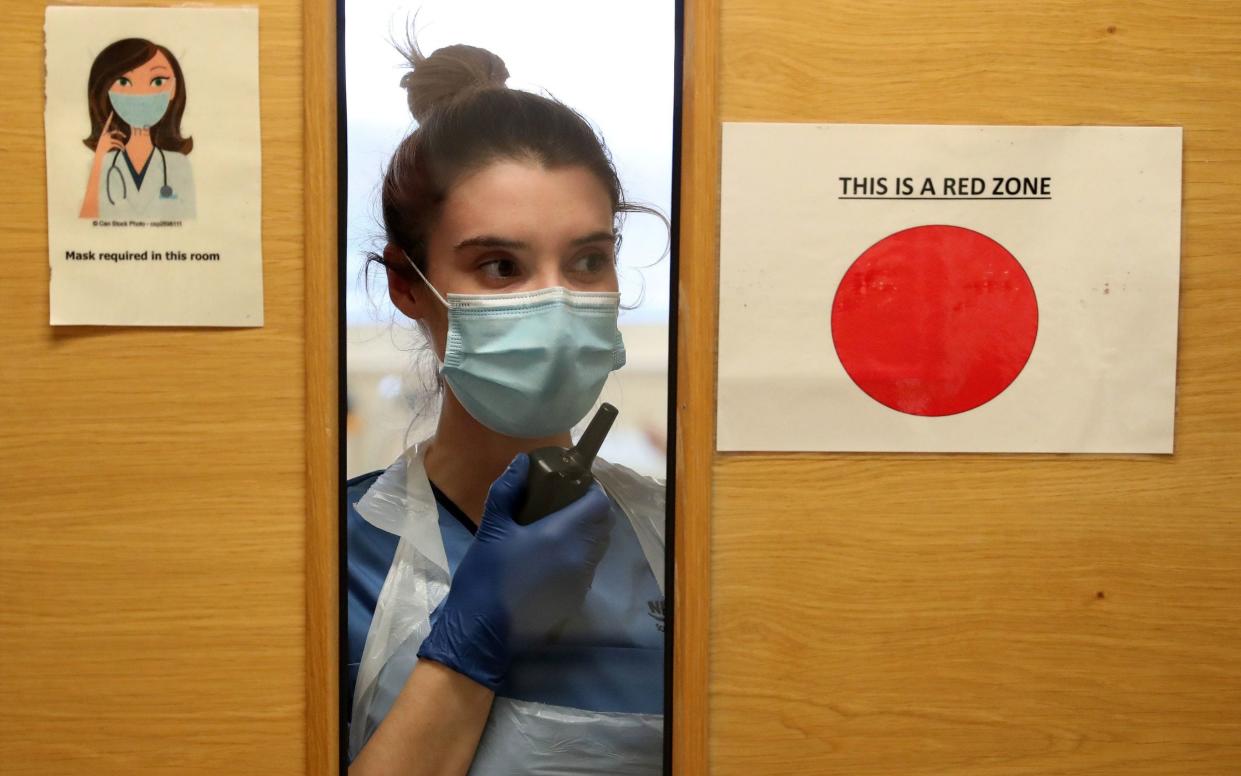Letters: Don’t blame the public for the sluggish rollout of booster vaccines

SIR – I was angry to read in your report (October 20) that the NHS is blaming patients for the low uptake of Covid booster vaccines.
I am in my 70s and would get my jab immediately – if only I knew where I could. To add to my frustration, over-50s are now being urged to get flu vaccinations, just as my own appointment has been postponed by a month.
Jill Bocquet
Glastonbury, Somerset
SIR – William Boog-Scott (Letters, October 20) had no trouble getting his booster vaccine. Not all of us have been so lucky. My second Covid jab was on April 16. In spite of trying to obtain one sooner, the earliest I can get the booster from my GP surgery is November 27.
Can we assume that the NHS has taken complete responsibility for this rollout, hence the current mess? Bring back Kate Bingham – pronto.
Dr Chris Topping
Pilling, Lancashire
SIR – I had my second Covid shot on April 10. On October 15 I received a text message from my doctor announcing an unexpected booster clinic the following day.
By 9.05am on Saturday I was in the surgery, arm bared. The doctor then asked whether, since they’d just had a delivery of over-65s flu vaccine, I would like that too.
Of course – and now that’s both of them done well before Christmas.
Robert Britnell
Canterbury, Kent
SIR – If we are being encouraged to get booster jabs because our immunity is beginning to wane, presumably we will need to do it again in six months’ time – and then again six months after that. When will it end?
Ann Wright
Cambridge
SIR – I was in my local pharmacy last week and inquired whether it would be offering flu jabs. I was told that it was already doing so, and that I could have one straight away. Why can’t more people be made aware of this service, thus alleviating GPs’ workload?
Elaine Winter
Whyteleafe, Surrey
SIR – On a recent trip to Switzerland and France, we felt confident that everything was being done to minimise the risk of Covid transmission.
Every shop, restaurant and museum required the wearing of face masks, in addition to social distancing. Our vaccination certificate was scanned each time we entered a hotel, restaurant or museum; entry would otherwise have been refused.
On our return to England, I was shocked by how lax we have become. We don’t appear to be following any of the safety guidelines. After the hardship and inconvenience we have all experienced, we seem to be throwing away any real chance of minimising levels of transmission.
Stella Currie
Bramhall, Cheshire
Hounding of veterans
SIR – That an 80-year-old man with significant health issues was made to travel nearly 600 miles during a pandemic to take part in something that could have been done via video beggars belief. That he then contracted Covid-19 and died as a result is tragic.
It says much that Regimental Corporal Major Dennis Hutchings left his home in Cornwall and made the journey to Belfast, where he was on trial for an alleged offence committed 47 years ago (report, October 20). However, it says little for the system that put him in this position.
Jonathan Mann
Gunnislake, Cornwall
SIR – It is a moral tragedy that any society should hound a veteran to death for something that occurred while he was serving his government so long ago, particularly after several inquiries, and with no new evidence.
In focusing on a few security force cases, Northern Irish prosecutors are failing to provide justice to the families of the more than 2,100 victims of Provisional IRA violence (more than 70 per cent of Troubles casualties). The secret deals and “letters of comfort” behind the Good Friday Agreement effectively robbed them of this.
Brigadier Roy Wilde (retd)
Barford St Martin, Wiltshire
Waiting on HMRC
SIR – I submitted my paper tax return in late May (I am in my 80s and do not find online applications easy). I have now been told that it may not be dealt with until late December, which does not leave much time for payment as post is often delayed.
Last year, I sent my return in June and I got the assessment in August.
Roger Dring
Tadworth, Surrey
Dressing down
SIR – The picture of the Duke of Cambridge at the Earthshot Prize awards (report, October 18) reminded me of the day I went to work at the MoD in a jacket, polo neck and trousers. My boss said: “Good morning. I do hope your neck gets better by tomorrow.”
The next day I wore a suit and tie.
Ian M Dobie RAF (retd)
Swindon, Wiltshire
SIR – Regarding the wearing of braces (Letters, October 20), I was taught that a gentleman’s trousers hung from the shoulders, not the hips.
Huw Wynne-Griffith
London W8
Heat pump subsidies
SIR – Neil Bailey (Letters, October 20) may be right that heat pump subsidies will benefit the well-off, but surely it makes sense, with prices at current levels, to target larger homes, particularly less well-insulated ones.
This will maximise carbon dioxide reduction, while increased take-up and investment will, in time, make heat pumps more affordable.
Neil Harvey
London SE8
SIR – Owners of historic houses are aware of the importance of ventilation and heating in their properties.
Strict insulation is not a practical option – but, in any case, how would the listing authorities react to the installation of heat pumps?
Nigel McKie
Helston, Cornwall
Church in decline
SIR – The Bishop of Leicester (Letters, October 20) defends his and Leicester diocese’s decision to implement parish clergy cuts and a “minster” model (clustering 20-25 parishes into huge groups served by a “ministry team” with at least one ordained person).
He writes that “parishes have long worked in benefices and teams” with “the cure of souls shared by priests, bishops and the whole people of God”. However, amalgamating parishes into benefices or large groups is to ignore the Church of England’s own report, From Anecdote to Evidence. This clearly states that “the larger the number of churches in the amalgamation, the more likely they are to decline”.
Where are the figures? All charities are struggling with donor behaviour after the pandemic (report, October 14). In any corporate or charity context – especially one like the Church of England, backed by a £9 billion investment portfolio – one would do serious cost-benefit analysis, study different economic and financial options and make risk assessments of projections and assumptions.
From this analysis, options would emerge, into which other factors could then be drawn (“customer” behaviour, changes in the market, macro-economic factors, fashion, human behaviour, technology advance, digitisation and so on) – before deducing the optimum course of action. This should have been undertaken, on behalf of all the Church’s 42 dioceses, before Leicester’s Diocesan Synod even considered this plan.
This is beyond managed decline. It is driven decline. The Church’s own studies show a clear link between ordained clergy, church attendance and parish giving. Driving down clergy numbers will drive down congregations, which will drive down giving, which will drive down the affordability of clergy – which will drive down clergy numbers.
This is a death spiral that needs to be arrested urgently. Parishioners, it is time to rise up to stop this madness.
Admiral Sir James Burnell-Nugent
Modbury, Devon
Miracle mail
SIR – The letter (October 20) about postal delays reminded me of an occasion in the 1950s that amazed us all.
A letter for my father was delivered to our house, addressed only to: “Parsonage [our name], Devon.” It had been posted a couple of days earlier from another part of the country.
M C Moore
Sutton Heath, Suffolk
SIR – Last week I received 18 cards for my birthday on Sunday. Every one arrived within a day or two of posting. No problems here.
Carry Hepworth
Petworth, West Sussex
Why beavers will wreak havoc in Britain

SIR – I am not sure the British know what they are getting into by reintroducing beavers. I have seen in the Canadian backwoods what these remarkable rodents can achieve. They are formidable lumberjacks, crafty engineers and capable of constructing large and robust dams. In short, they are landscape changers.
In discrete populations they might be successful. However, when they inevitably spread to the wider river network, as well as towns and cities, they will be a nuisance. Dam removal, tree protection initiatives, animal relocation and culling programmes will all be expensive.
Britain might instead concentrate its funds on the endangered fauna that are still present. For instance, I have lived here for several years but have yet to see a hedgehog.
John Gordon
Bradford-on-Avon, Wiltshire
Assisted Dying Bill will harm disabled rights
SIR – We are from different political backgrounds but are united in our opposition to the attempt to change the law on assisted dying.
Baroness Meacher’s Bill would disproportionately threaten disabled people, question the value of our lives and suggest that assisted suicide is an option we “should” be considering.
Rights groups have long been concerned about pressure being put on disabled people to end their lives prematurely for fear of being a personal or financial burden on loved ones.
The legal, medical and social implications of the Bill for disabled people are enormous. They need to know that doctors are obliged to do all they can to help everyone to live a good life. The current law keeps unconscious discrimination and social bias towards disabled people in check.
Supporters of the Bill neglect to mention that none of the leading disability rights groups support a change in the law. Given Covid’s disproportionate impact on disabled people – 60 per cent of deaths – it is crucial that protection is strengthened. This Bill would weaken it, with fatal unintended consequences. We urge our colleagues to oppose the Bill.
Baroness Campbell of Surbiton (Crossbench)
Baroness Grey-Thompson (Crossbench)
Lord Shinkwin (Con)
London SW1
SIR – It would be strange if Charles Moore (Comment, October 18) was not an ardent opponent of assisted dying; his Catholicism dictates that. But he must surely accept that others have the right to an opposing opinion, and to be in favour of it just as passionately.
This is a moral debate, not a medical one, and the real question is why his views should be imposed on the great majority, rather than disagreed with but accepted.
I want to die with my head held high and with dignity, not a helpless dependent. My life, my death, my choice. I have seen enough “bad” deaths to be certain of that.
Dr Tim Howard
Wimborne, Dorset
Letters to the Editor
We accept letters by post, fax and email only. Please include name, address, work and home telephone numbers.
ADDRESS: 111 Buckingham Palace Road, London, SW1W 0DT
FAX: 020 7931 2878
EMAIL: dtletters@telegraph.co.uk
FOLLOW: Telegraph Letters on Twitter @LettersDesk

